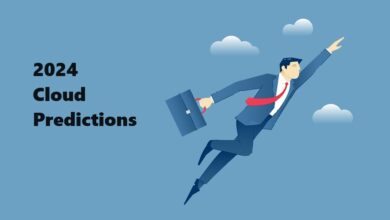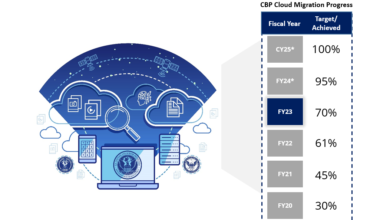Ace Cloud Computing: Essential Syllabus Guide 2024

Key Takeaways:
- Scalability and Flexibility: Cloud computing adjusts resources to changing demands, enhancing organizational agility and efficiency.
- Cost-Efficiency: Cloud computing reduces costs by eliminating the need for expensive physical hardware, offering pay-as-you-go services.
- Enhanced Security: Cloud providers invest in robust security measures like encryption and access control to safeguard data.
- Innovation and Agility: Cloud technology facilitates rapid innovation and business agility through diverse service offerings and development tools.
If you want to go on a journey to master cloud computing, then you have to follow a proper approach that involves understanding the basics to mastering advanced concepts to have a proper grip on the topic. This blog will act as a guide for you where we will give you a complete roadmap on the cloud computing syllabus so that following this, you can master this field. So, whether you are an aspiring professional or want to enhance your skills to get a better position at your job, this blog will help you a lot.
What is Cloud Computing?
Cloud computing has changed the way businesses and individuals use to access, store, manage, and process data and applications over the Internet. In cloud computing, the work of storing, managing, and using various resources can take place over the Internet. And these things are stored and managed by paying for the services that you are using. This helps organisations to relax as now they don’t have to maintain physical hardware and infrastructures in their premises and this will help to provide flexible IT solutions.
So, if you want to enter the world of cloud computing, you need to understand the fundamentals of cloud computing so that you can provide great value to the company. Having a proper approach to learning this topic is very essential so that you can complete the cloud computing syllabus efficiently. The syllabus will act as a blueprint that will give you the knowledge of basic concepts, topics, and learning objectives that are very essential to develop mastery over cloud computing.
The details that we will be providing you about cloud computing will provide you insights into the whole topic. We will be providing you with information about cloud architecture, deployment models, security, data management and a lot of other topics that are important to master to develop mastery over cloud computing.
Ideal Cloud Computing Syllabus
1. Cloud Computing Fundamentals
In this, the students will be made familiar with the very basic concepts of Cloud computing that are very important to be known. This section will provide you with knowledge about what cloud computing is, its evolution, and its impact on the IT sector. Also, you will be learning about various cloud computing services like PaaS, SaaS, and IaaS. You will also learn about various public, private, hybrid and multi-cloud architecture models as well.
2. Core Cloud Platforms
This section of the cloud computing syllabus will be focused on major cloud computing platforms that are offered by various tech giants. Amazon offers cloud computing services via Amazon web services, and Microsoft offers cloud services via Microsoft Azure. Google also has its cloud computing services offered by the Google cloud platform. Having practical experience of how these tools and services will work will ensure great professional achievements.
3. Cloud Architectures and Services
In this section, the students will be learning how they can design cloud-native applications and microservices. There are various computing services offered like storage, computing, networking, databases, and serverless computing that will be explored in this.
4. Cloud Security and Compliance
This section of the Cloud computing syllabus will provide you with information about the cloud security challenges and best practices that you can take. Here, you will also learn about identity and access management and compliance networks that govern these cloud environments.
5. Data Management and Analytics in the Cloud
This section will help the students to learn about data management and analytics solutions performed in cloud platforms. In this, topics like cloud databases, big data analytics, and data warehousing are taught.
6. Cloud Application Development
In this, students will learn about containerisation, orchestration, and serverless computing using various tools like Docker, Kubernetes and a lot more.
7. DevOps in the Cloud
In this section of the cloud computing syllabus, the students will learn about DevOps importance in the cloud. In this, they will learn about Continuous integration, continuous deployment and infrastructure as code principles.
8. Cloud Migration Strategies
Here you will learn about various migration strategies involved in cloud-like migration planning, risk mitigation and post-migration optimization techniques.
9. Performance and Scalability in the Cloud
In this, the students will learn about how they can optimize the performance of cloud computing devices and perform various things like auto-scaling, load balancing, and designing for elasticity.
10. Project
Project is a very important part of Cloud computing syllabus, as here the learners can apply all the rules and theories they have learned and work on real-life problems and get learnings from them.
How do I choose the right cloud computing course for me?
To choose a correct cloud computing course for yourself, you need to be very sure about your personal goals and then check whether the specific course aligns with the goals that you have or not. Also, your current level of cloud computing skills needs to be matched with the level of skills the course demands. Along with all these things, check the cloud computing syllabus they are offering and the eligibility criteria for the same and this will help you to ensure proper learning. Don’t forget to check the credentials of the instructor, the certifications they have done, their industrial experience, and the teaching experience and reviews that they have. All these factors will help you to get a good mentor in your journey. Also, get proper details about the costs and ROI. And one important aspect is to check whether they provide any practical, hands-on experience or not. Because you cannot expect to get good career options with just theoretical concepts and no practical experience. Therefore, having practical experience is a must.
Don’t let it rain on your parade! Start your career in Cloud Computing today with our Post Graduate Program In Cloud Computing!
Conclusion
Hence, selecting the right cloud computing course, such as Post Graduate Program in Cloud Computing, is very essential and while selecting you must keep a lot of factors discussed in this roadmap in your mind to choose the perfect one for you. Also, this journey to become a professional cloud computing developer will take time and a lot of hard work, so go into this field with a positive mindset and willingness to do a lot of hard work and you will excel in this.
FAQs:
1. Do I need prior technical experience to start learning cloud computing?
No, many courses are designed for pure beginners, so having prior technological knowledge is not important.
2. How long does it take to complete a cloud computing syllabus?
This depends on various courses, their complexities and formats. Some might be for 3 months, some for 6 months. So while choosing the course, check the duration you are comfortable with.



